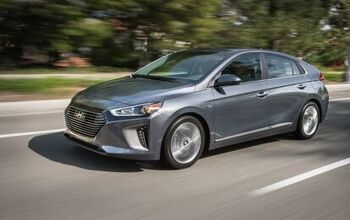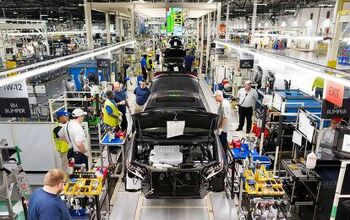Here's The 2017 Hyundai IONIQ to Take On The Prius

Hyundai on Monday revealed its 2017 Hyundai IONIQ ahead of its official reveal at Geneva in March and my goodness it’s already yelling at me.
The hatchback has been in the works for some time by now, which we already knew. Hyundai cleared up some of the technical details that we were waiting on — but not its fuel economy, apparently.
Sheesh.
For starters, the Ioniq (I can’t caps anymore, sorry) is powered by Hyundai’s all-new 1.6-liter Atkinson-style cycle engine and a lithium-ion polymer battery that produce 103 horsepower and 42 horsepower respectively. Hyundai didn’t specify what the total combined output of the Ioniq could be, so we’ll have to wait on that because apparently the combined horsepower number maths harder than just adding the two together.
According to Hyundai, the internal combustion engine is the world’s most heat-efficient engine — although Toyota cited the same 40 percent thermal efficiency figure when it unveiled its new Prius engine.
The Ioniq’s power is shifted through a six-speed dual-clutch transmission because CVTs are just plain silly. Hyundai said the transmission has been optimized for the hybrid system, and transmits more than 95 percent of the power to the wheels.
In addition to powertrain improvements, the automaker detailed weight savings in the car. Hyundai said an aluminum hood and tailgate helped to cut roughly 25 pounds from the overall weight of the car, in addition to extensive use of high-strength lightweight steel.
Inside, the Ioniq looks like a Hyundai — good or bad.
The setup looks fairly plain, and we already know that it’ll sport Apple’s CarPlay. Compared to the 2016 Prius, which I drove last year, the Ioniq looks fairly sleepy, but far from brash like higher trims of the Prius.
Hyundai didn’t specify how much, or when the car would go on sale. We know it’s coming this year, but now at least we know what it looks like and some of what’s underneath.

More by Aaron Cole
Latest Car Reviews
Read moreLatest Product Reviews
Read moreRecent Comments
- 1995 SC I will say that year 29 has been a little spendy on my car (Motor Mounts, Injectors and a Supercharger Service since it had to come off for the injectors, ABS Pump and the tool to cycle the valves to bleed the system, Front Calipers, rear pinion seal, transmission service with a new pan that has a drain, a gaggle of capacitors to fix the ride control module and a replacement amplifier for the stereo. Still needs an exhaust manifold gasket. The front end got serviced in year 28. On the plus side blank cassettes are increasingly easy to find so I have a solid collection of 90 minute playlists.
- MaintenanceCosts My own experiences with, well, maintenance costs:Chevy Bolt, ownership from new to 4.5 years, ~$400*Toyota Highlander Hybrid, ownership from 3.5 to 8 years, ~$2400BMW 335i Convertible, ownership from 11.5 to 13 years, ~$1200Acura Legend, ownership from 20 to 29 years, ~$11,500***Includes a new 12V battery and a set of wiper blades. In fairness, bigger bills for coolant and tire replacement are coming in year 5.**Includes replacement of all rubber parts, rebuild of entire suspension and steering system, and conversion of car to OEM 16" wheel set, among other things
- Jeff Tesla should not be allowed to call its system Full Self-Driving. Very dangerous and misleading.
- Slavuta America, the evil totalitarian police state
- Steve Biro I have news for everybody: I don't blame any of you for worrying about the "gummint" monitoring you... but you should be far more concerned about private industry doing the same thing.



































Comments
Join the conversation
Still don't see a lot of 10 year & older Hyundai's running about. The style nice cars. But there's always an issue.
I like the design here. Considerably better looking than the new samurai-attacked Prius. Maybe integrate the pull area of the hatch a little better, the dark space under the logo is clunky looking.